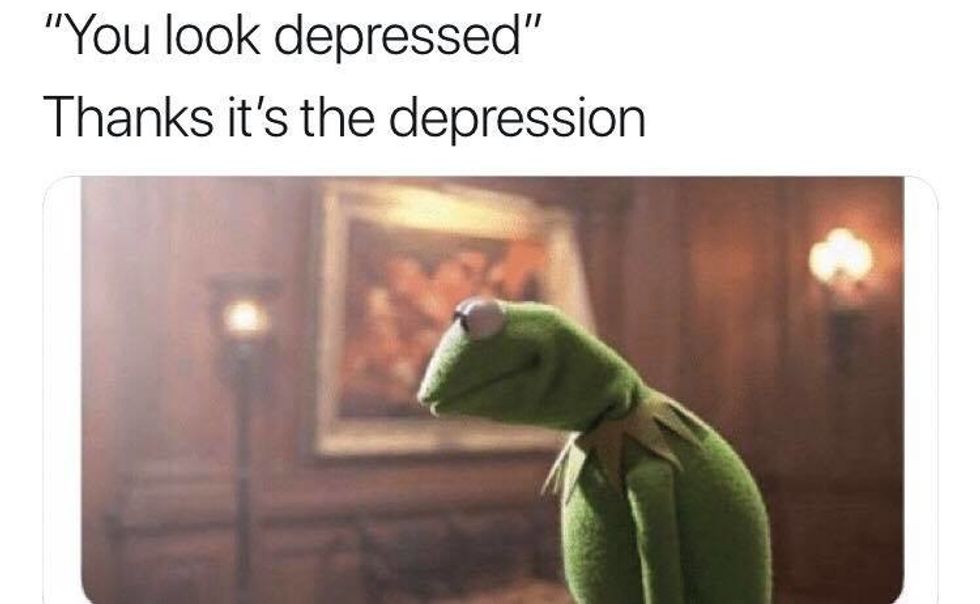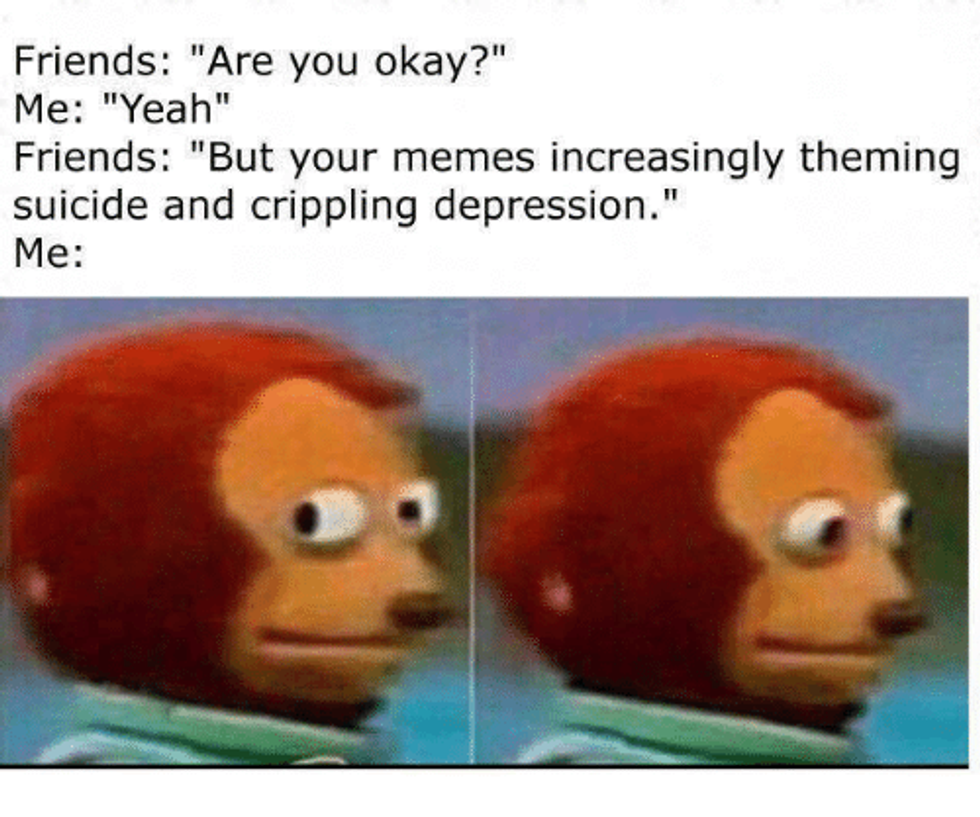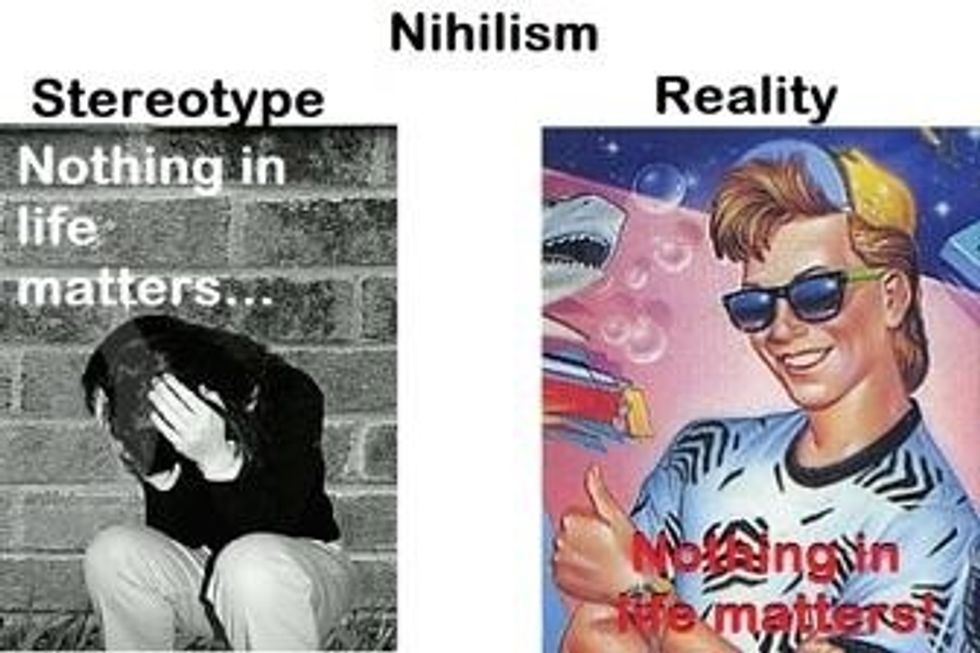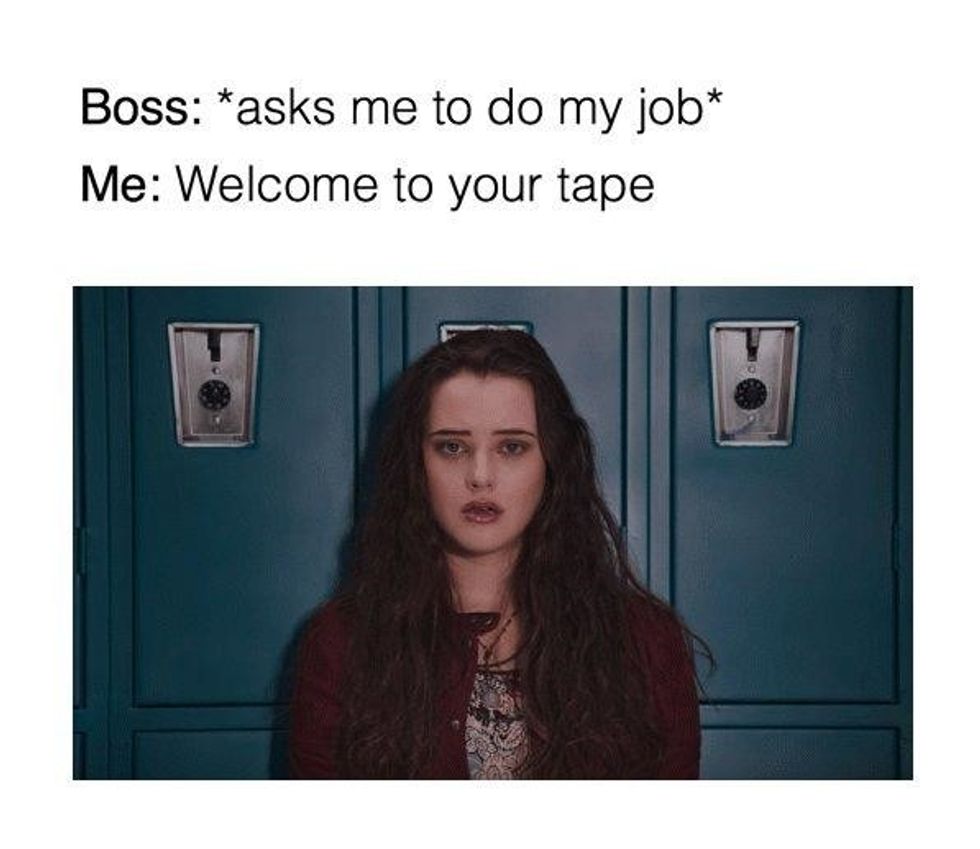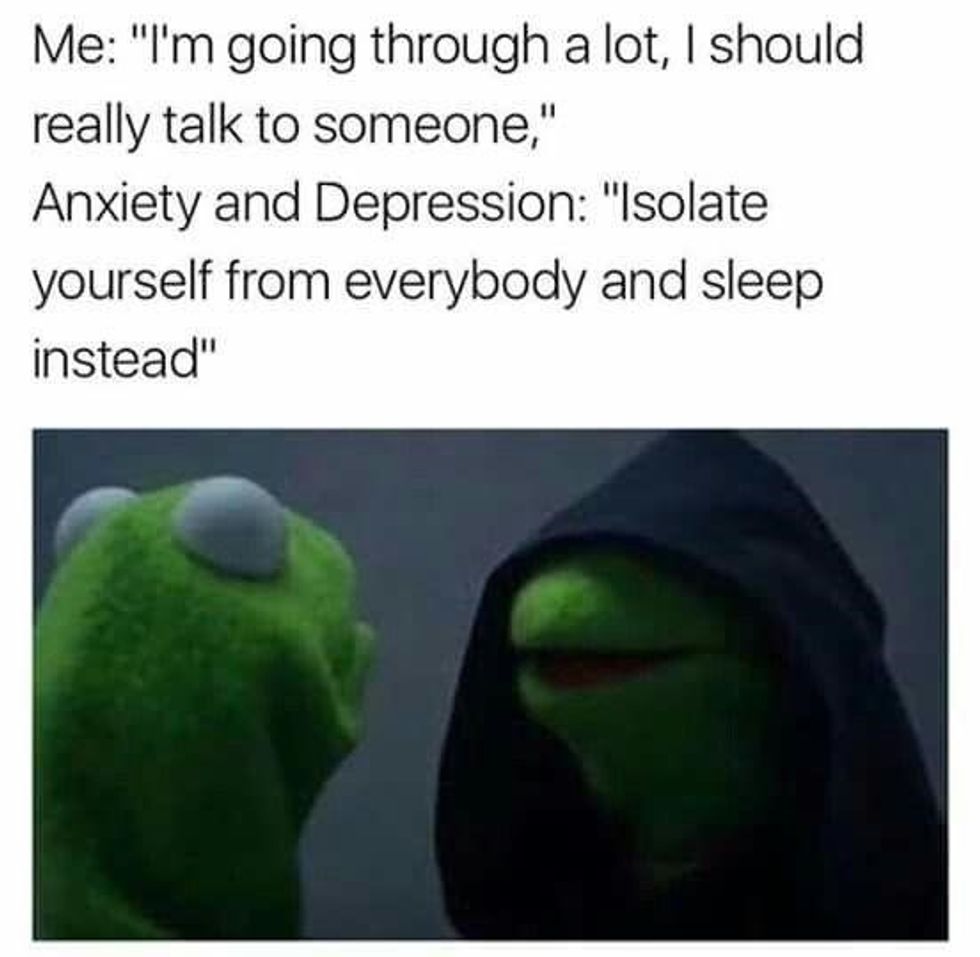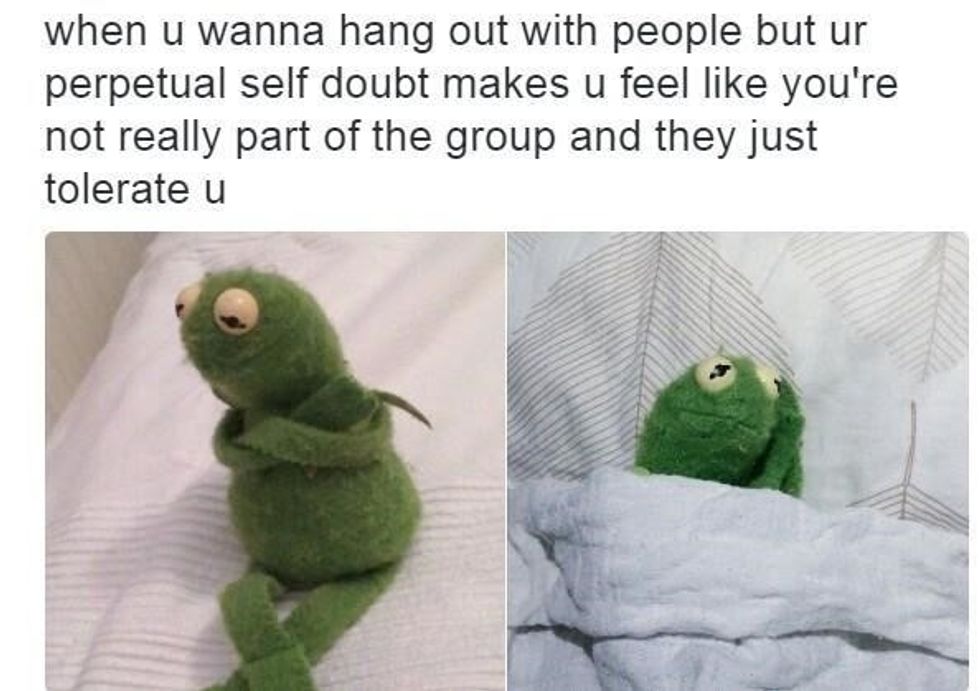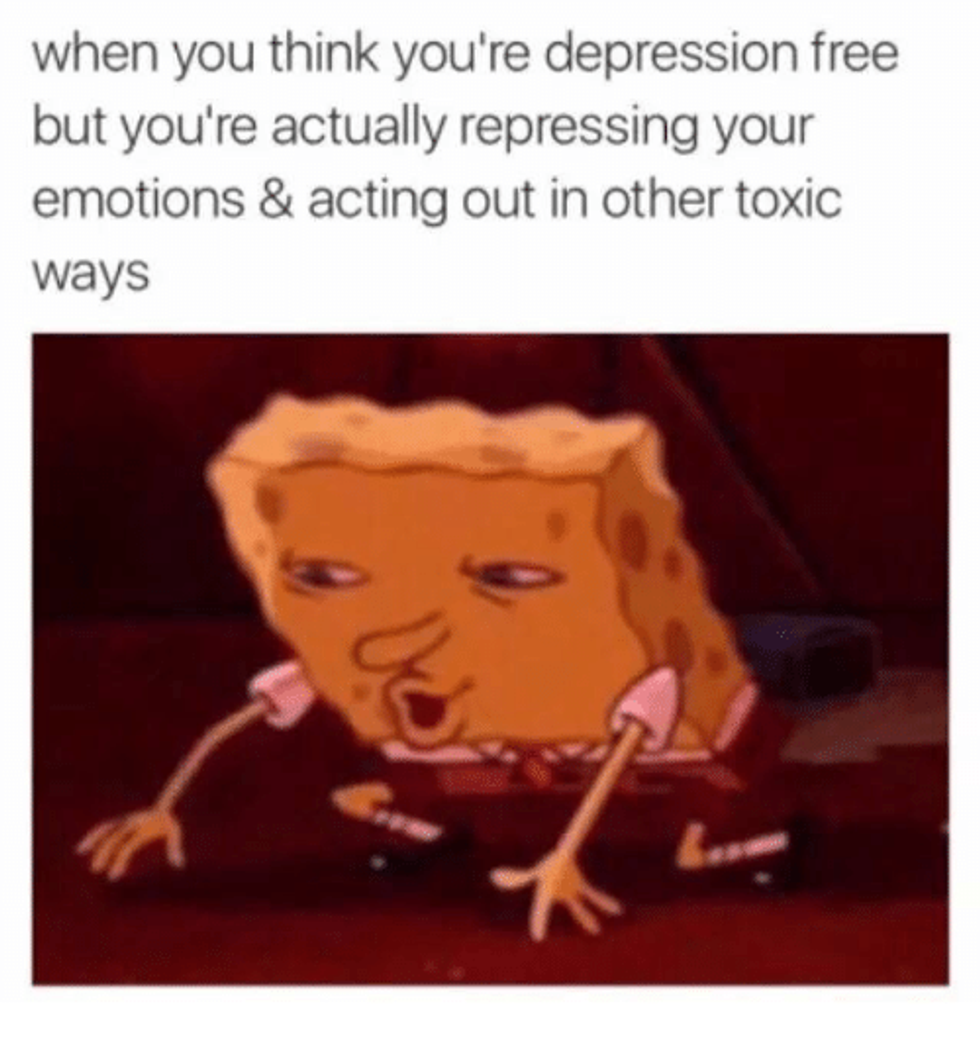This was originally an 8 page essay I wrote for my English Comp 1 class and received a C on it I believe. Originally written back in early/mid 2017 when depression memes were thriving but Wholesome Memes seem to have taken over now in 2018, which is better than being sad people laughing at our sadness.
My favorite line in this is, "This show caused a new meme wave". Memes are so life changing, sister shook.
Whether you are scrolling through Facebook, Instagram, or Twitter, you will see pictures or videos that went viral and have everyone laughing; this is known as a meme. Memes are a shareable image, gif, or video clip, often including text. They are an easy global inside joke, often referencing popular culture, or things that have ironic status. It's a big joke that everyone knows about, and anyone can change it to fit their idea. Memes are sort of like the funnies in the Sunday paper; only they're just one frame long. Memes commonly are silly jokes or related to current issues, but recently a new form of memes have been emerging: depression memes. This type of meme ranges from clever puns, Kermit the frog, or being plain out ironic, but still able to tie itself to depression and mental illnesses. People view this meme as a negative and possible to worsen or cause others to develop depression, but others contradict and say that they are a way to been an outlet for them to help cope with their current depression and been therapeutic.
Throughout history, we have been introduced to many things that made waves in our lives such as fire, electricity, books, and—the mightiest—the internet. But the most significant thing we have been introduced to is meme culture. Memes have become something we can casually talk about and share in a chain email with everyone in the office and not worry that we'd be fired. Memes have risen to such fame that the word "memeing" and "memed" has been added to the Dictionary (memeing/memed=to create and spread memes). Back in May 2017, there was even a crisis with there not being enough new memes being made and people started to use old ones, which people began to refer this time as The Great Meme Depression. Memes have been able to affect us drastically as the meme Pepe The Frog got classified as a hate symbol back in July 2016 by the Anti-Defamation League due to the erratic way people would use his image. Memes have risen to such fame that they're now being used to advertise to people. Gucci recently released an art campaign back in early 2017 featuring their clothing in the style of a popular meme. While memes are being used to advertise now, they're starting to be used to talk about mental health.
In recent years, memes have changed from being just a random image to now a message to spread. Still sticking to the main set up of repeated images, audio or video, each with a usually visible theme, their format has become looser. Now being able to fall into a specific category or theme expressing certain feelings or situations. Each Meme has a particular theme attached to it. For example, "Bad Luck Brian" was a popular meme made from an unfortunate yearbook photo and was used to explain the awkward or unfortunate situation. Now there's a meme that can be classified as the "depression" meme. Depression memes have been around for years, first starting on Reddit with the KILL ME Dog meme featuring a dog in an argyle sweater looking sad about it and wanting to die. But the emergence of depression memes truly started when Youtuber IDubbbzTV2 uploaded a video called "Disabled Pokemon Go-Eevee + Zubat" which featured him jumping into a wheelchair saying, "I have crippling depression" (IDubzz). During this time, IDubzz had a fairly large subscriber base, and so his followers began using this newly coined term in memes to depict how they felt humorously. A majority of his followers are teens to young adults who could have found this to be relatable in a light, humorous way which is why they began sharing it. How and why certain memes become popular is not always clear and easy to explain. In theory, meme trends should be a reflection of a widespread cultural feeling. American memes from 2016 tended to reflect a general disinterest in politics and culture at the time. Nihilist memes were very viral, and they showed a growing detachment to the disturbing events and catastrophe of 2016. Memes, vines, and GIFs could be seen as a "mirror" to what the people feel, and since we're now realizing this, we can now point out concerning emotions such as depression.
Now that memes are becoming more popularized on social media, they have begun surfacing on Facebook with pages like 'Crippling Depression', 'Depression Memes', 'My Memes Are Ironic My Depression Is Chronic', and 'Don't End My Life Because I Relate To Memes'. These pages post almost daily with memes focusing on topics like loneliness, depression, and even suicide. The Facebook meme page, Crippling Depression (a recently deleted meme page), was able to give an insightful view when asked what was the purpose of this account and if it was a way to help cope with their own depression: "I made this meme page to feel better about myself by expressing myself in intricate memes that paint my suffering with a picture people can relate or feel alike in, never my intention to make fun of souls experiencing life with such discontent". When asked what he enjoys most about this type of meme he responded with, "I really can't cope with what it means to exist, and the emptiness leaves me when I laugh when I feel connected to others to be ultimately honest". Many people on these pages do start to form a connection with one another within the comment section, where they start comforting each other and ways to cope with whatever issues they're facing. Amanda Purington, a research support specialist from Cornell University, says that these types of pages can help give voices to these feelings and she believes that this type of meme can help break the idea that talking about suicide is taboo. But some of the approaches to these memes has caused criticism.
The talk about laughing at depression been around on Reddit and 4chan for years with memes likes "Kill Me" or "I want to die", but some believe that depression and suicide became more glamorized because of the show 13 Reasons Why on Netflix. 13 Reasons Why came out back in 2016 where the main character, Hannah Baker, commits suicide and left individual tapes to 13 people explaining why they're connected to her. 13 Reasons Why was a breakout success with viewers and critics; it became one of Netflix's highest rated shows and the most-tweeted series shortly after its release. Although some critics were split on the treatment of Hannah's character, her death particularly sparked something new on the internet. This show caused a new meme wave to emerge with people making light jokes on the topic of suicide. Everyone seemed to understand the message of the show but decided to show it in a humorous way: rather than talking about the actual topic of suicide, why not talk about it through memes? With memes being the newest way to spread certain topics, they made it more approachable to talk about mental health with younger people such as high schoolers or college students. 13 Reasons Why was able to connect with young adults, as Hannah is currently a sophomore in high school. She gave a slightly better understanding from someone else's perspective who isn't fully taught about mental health but are experiencing the signs of mental illness. The article "How Memes Taught Millennial's to Talk About Mental Health" written by Wendy Syfret, currently Head Of Verticals at VICE Media, talks about the significant affect memes have on young adults: "Two things make it easier to speak about difficult subjects: humor and distance — qualities that memes naturally provide.". In her article, she interviews teens and meme pages questioning the new depression meme phase. Syfret interviewed Instagram account @sagittariusmemeadmin, who's currently a senior in high school, asking why she uses memes as an outlet. "I'll make a meme about something when I'm sure I can't talk about it with anyone else because I've already talked about it too much or it's just too personal or it's a secret," she explained, "feels like someone else is saying it...It softens the blow of regular conversation.". Depression memes have become an outlet for many, especially young adults who are still figuring out their emotions and mental state. While the 13 Reasons Why meme wasn't the best way to help spread awareness on mental illness, it did get the importance of the topic out there. But there's another meme that was able to do just the same in a more prominent way, and also help people confront it with others as well.
One meme that helped spread the depression meme has been the Evil Kermit meme. Many have been using this meme to express emotions toward school, significant others, and diets, but others have been broadening the use of this meme. It has been able to give life to mental illnesses and help people actually visualize it. Being able to "see" their mental illnesses helps them and others fully understand what they're struggling with and how hard it truly is to get better, "By turning these disorders into actual beings, it's a little easier to confront them. They aren't these nebulous, abstract things to fear. Anxiety becomes that jerk causing you to overthink, depression the asshole keeping you in bed all day, or the inner Dark Kermit whispering in your ear" (Roffman). Evil Kermit was able to help shine a light on and became a comforting way to understand mental illness. While the most popular Evil Kermit meme did help spread the depression meme to the normies (slang for a conventional and mainstream person, an average joe), other Kermit memes like Kermitting Suicide, Sad Kermit, and Bathtub Kermit have also been successful in doing so. They all succeeded to help others see what people with depression might go through, but some do not agree that we should be able to see such a thing.
Although depression memes might be a way for one to express how they feel, some see it as a trigger for those who might be suffering through mental illness and might cause one to relapse back into depression. But the problem is that the people who are mentioning this don't fully understand depression. They seem to understand the issue with depression but not the deeper meaning behind it. Reddit account user 2meirl4meirl gives a brief explanation of the depression meme and his encounter with them, "[T]here's nothing wrong with not getting them, in fact, if you don't get them, that's probably a good thing, it means that your life has been pretty great," (Connelly). He also states that this type of meme does mean more than just the dark humor on the surface, "If you were to ask me why I enjoy that kind of humor it's because they weren't always completely jokes". These memes bring humor to mental illness and show that it's capable of lessening the heavy weight of depression. Juliette Virzi who is an Associate Mental Health Editor for The Mighty wrote an article over the depression meme called "21 Memes That Might Make You Laugh If You Have Depression Or Anxiety" where she discussed the benefit of such dark humor, "Sometimes humor can be used to broach a serious topic you otherwise wouldn't know how to talk about. Sometimes, sending a relatable mental health meme to a friend can bring a smile to their face on days when it's hard to get out of bed. Other times, seeing a funny meme can let you know you aren't the only one feeling this way."
With Depression memes rising, it opens a whole new door for people to express and talk about how they genuinely feel rather than it being off limits. Instead of just showing their feelings by saying things like "Today was hard" or "Not My Day", people can express their true pain by saying, "Today was hard because of I couldn't get out of bed." Depression memes may be concerning to some people, but it's finally getting people to talk about it and the possible outcomes it contains. So many people are scared to talk about such topics as it can make things awkward or be seen as "taboo", but that is what's holding us back and making this illness even worse. Kevin Breel who is a mental health activist appeared on a Ted Talk titled "Confessions of a Depressed Comic" where he openly spoke about his experience with depression and how important it is that we talk about this now. "It seems to be hard for everyone to talk about, so much so that no one's talking about it. And no one's talking about depression, but we need to be because right now it's a massive problem" (Breel). It's important that we talk about depression, as, according to WHO (World Health Organization), every 40 seconds someone commits suicide. We shouldn't need to take a certain type of meme to incite humanity to talk about mental health; all of the struggles of people who suffer from depression should be enough to spark the conversation. People who suffer from depression must learn to handle their emotions on their own or pay hundreds to thousands of dollars to support their mental health because no-one wants to talk about it. "We live in a world where if you break your arm, everyone runs over to sign your cast, but if you tell people you're depressed, everyone runs the other way" (Liberti). Depression memes may be seen as harmful, but it helps people feel less isolated.
It may be said that depression memes are causing people to get triggered, but it also can be therapeutic for others. Something we always seem to dodge is conversation focusing on our mental health due to the idea of it being something abnormal. When in fact, talking about mental health is extremely important for everyone. Being able to speak of such a serious topic will help people feel more comfortable approaching these certain feelings rather than ignoring it and putting a mask on. With memes, we've been able to start the conversation and have it passed on to others facing similar issues. Hopefully the next time you see a meme that might be considered "edgy" or "spicy", you'll probably think twice about how that person is currently feeling.
Chen, Tanya. "We Found The Creator Of The Sad Kermit Meme And She's Got A Vault Of Kermit Memes." BuzzFeed, 14 Dec. 2016, www.buzzfeed.com/tanyachen/we-found-the-creator-of-the-sad-kermit-meme?utm_term=.roAb005xd#.cnQ8OO5Dp.
Connelly, Gabriel. "Self-loathing memes may be a form of therapy." Vice News, 2 Aug 2017, https://news.vice.com/story/suicide-memes-may-be-a-form-of-therapy.
Moreau, Elise. "What Are Internet Memes and Where Did They Come From?", LifeWire, 25 October 2017, https://www.lifewire.com/what-are-internet-memes-3486448
Nordqvist, Christian. "One Million People Commit Suicide Each Year - World Suicide Prevention Day, September 10th, 2011." Medical News Today, MediLexicon International, 10 Sept. 2011, www.medicalnewstoday.com/articles/234219.php.
Roffman, Otis. "The Sad Truth About Depressing Memes." Study Break, 21 June 2017, https://studybreaks.com/2017/06/21/memes-4/.
Syfret, Wendy. "How Memes Taught Millennials to Talk about Mental Health." I-d, 13 Feb. 2017, i-d.vice.com/en_au/article/43wenm/how-memes-taught-millennials-to-talk-about-mental-health.
Virzi, Juliette. "21 Memes That Might Make You Laugh If You Have Depression or Anxiety." TheMighty, 11 Oct 2017, https://themighty.com/2017/10/funny-memes-anxiety-depression/.
"Casually Suicidal | Sarah Liberti | TEDxAdelphiUniversity." YouTube, uploaded by TEDx Talks, 5 May 2017, youtu.be/S8bJ3YlgL1Q.
"Disabled Pokemon Go-Eevee + Zubat." YouTube, uploaded by IDubbbzTV2, 17 July 2016, https://youtu.be/mIxxL-yhnsY
"Hannah Baker." Wikipedia, Wikimedia Foundation, 30 Apr. 2018, en.wikipedia.org/wiki/Hannah_Baker.
"Pepe The Frog- Hate Symbols Database" ADL, 2016, https://www.adl.org/education/references/hate-symb...
"The Great Meme Depression" Urban Dictionary, 27 June 2017, https://www.urbandictionary.com/define.php?term=The%20Great%20Meme%20Depression)
"Why We Need to Talk about Depression | Kevin Breel." YouTube, uploaded by TEDx Talks, 27 Sept. 2013, youtu.be/-Qe8cR4Jl10.

